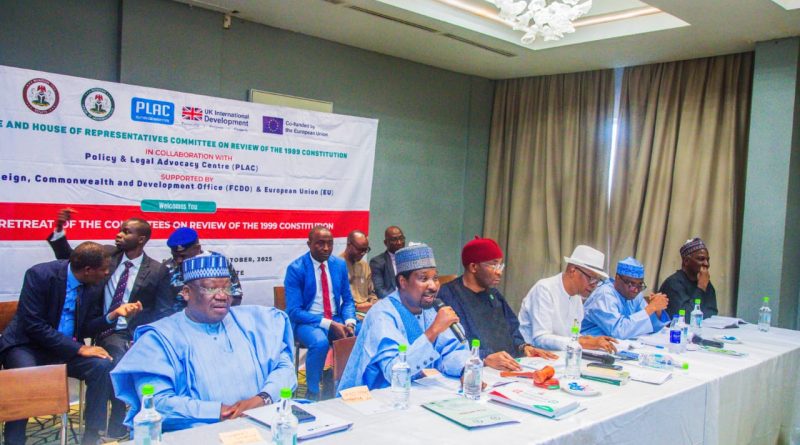NASS joint committee approves creation of six new states
The National Assembly Joint Committee on Constitution Review has approved the creation of six new states, one in each of Nigeria’s geopolitical zones, as part of its resolution in the ongoing review of the nation’s constitution.
If ratified, the number of states in the country will rise from 36 to 42, with the North-west having eight, and the North-east, North-central, South-west, and South-south having seven each, and the South-east six.
The decision was reached during a two-day retreat held in Lagos from Friday to Saturday.
The committee also resolved to establish a sub-committee to determine the specific areas from which the six new states will be created. Chief Whip of the Senate, Tahir Monguno (APC, Borno North), was appointed to chair the sub-committee.
The retreat reviewed 55 proposals for new states, two boundary adjustment requests, and 278 requests for the creation of additional local government areas from various interest groups across the country.
PREMIUM TIMES had reported that the committee resolved to create a state for the South-east to bring the number of states in the zone to six. It currently has five states: Abia, Anambra, Ebonyi, Enugu, and Imo.
Chairpersons of both chambers of the National Assembly, Deputy Senate President Barau Jibrin, and Deputy Speaker Ben Kalu, are expected to present the committee’s resolutions when lawmakers reconvene for plenary.
The proposals will then be debated at the Committee of the Whole, where members will vote to approve or reject them.
Constitutional procedure for creating new states
Section 8 of Nigeria’s constitution outlines the procedures and requirements for the creation of new states.
It stipulates that the process must begin with a formal request signed by at least two-thirds of the elected representatives (Senators, members of the House of Representatives, and members of the State House of Assembly) from the area seeking the new state.
According to Section 8(1)(b), the proposal must then be approved in a referendum by at least a two-thirds majority of the people in the area demanding the new state.
Under Section 8(1)(c), the outcome of the referendum must subsequently be endorsed by a simple majority of all the states in the federation, supported by a simple majority of members of the State Houses of Assembly. This means that the referendum must receive approval from at least 19 states and not less than 51 per cent of state lawmakers nationwide.
Finally, Section 8(1)(d) requires that the proposal be approved by a two-thirds majority of members in each chamber of the National Assembly.
Once these steps are completed, the resolutions are transmitted to the President for final assent.
Possible challenges
The joint committee had earlier pledged to conclude the constitution review process and transmit its final recommendations to state Houses of Assembly before the end of the year.
Since Nigeria’s return to democratic rule in 1999, the 1999 Constitution has faced widespread criticism for being outdated in light of the nation’s technological, social, and political evolution. Although the National Assembly has amended the document five times, many proposed changes have been rejected by state legislatures.
READ ALSO: Reps move to strengthen EFCC’s independence, accountability framework
Over the years, the review has also attracted public concern over its cost, as each phase of the exercise has been allocated significant funds.
The approval for six new states is expected to generate fresh political contestation among governors and influential political figures seeking to have the new states located within their regions.
For instance, in the South-west, a bill proposing the creation of Ibadan State has passed second reading in the House of Representatives, while another seeking to establish Ijebu State is also under consideration.
Similarly, there is a bill proposing the creation of Anioma State, currently part of Delta State. The bill is sponsored by Ned Nwoko (APC, Delta North). There have been agitations that Anioma should be recognised as the sixth state in the South-east geopolitical zone, given that it is a predominantly Igbo-speaking area, rather than approving any of the other ongoing state creation proposals in the South-east.

